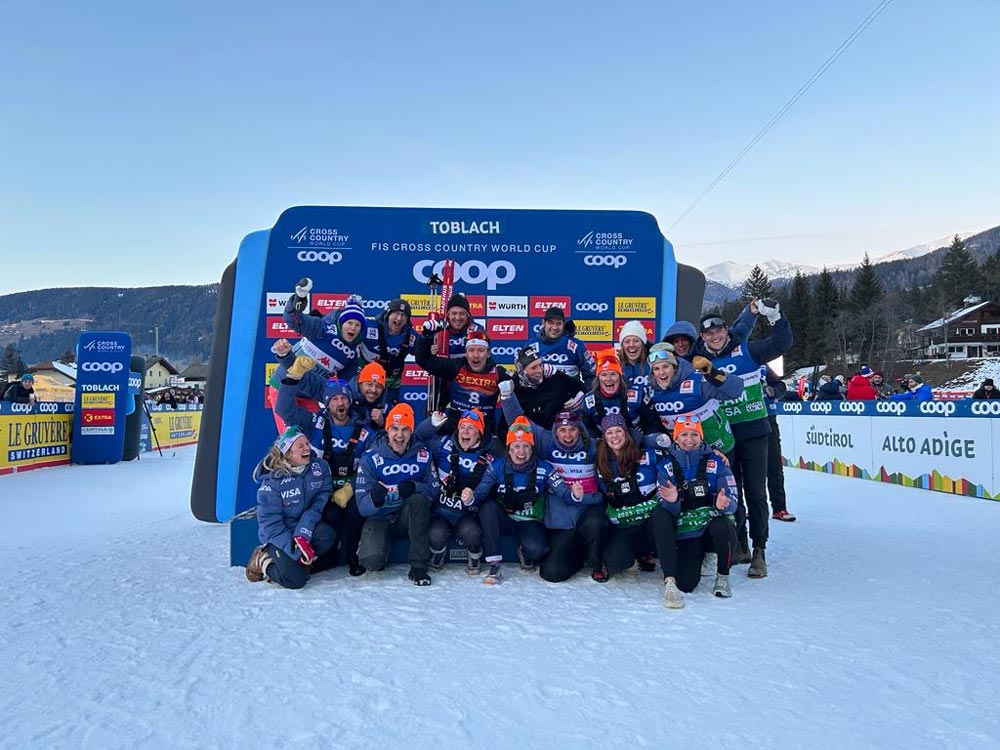
For the U.S. Ski Team, the 2024 Tour de Ski—the notoriously grueling seven-stage, multi-day race in Italy and Switzerland—was a tour of firsts. It was the first time that a U.S. skier made the podium almost every day, the first time four separate skiers earned top-three finishes (including a man) and the first time an American won the famed Alpe Cermis hill climb.
But it was the second time that Jessie Diggins won the Tour de Ski. En route to the win, the 32-year-old Olympic champion finished in the top-three four times, including a decisive win in the 20km pursuit freestyle. Her Tour win came less than two months after Diggins had shared that she was prioritizing her mental health over competitive goals and was unsure what this season would look like.
“No one is more surprised than me,” Diggins said during a post-Tour recovery camp. “This has been a huge shock in a good way.”
“I think a lot of it has been in many ways the removal of pressure,” she added. “I’m seeing racing as this incredible absolute gift and privilege, and I’m happy to be here. Instead of ‘Oh, you should go win these races,’ it’s like, I didn’t even know if I would be racing, so I’m just going to go out there and do my best. When I race like that, and I’m smiling because I’m happy to be there, that’s when I tend to race really well.”
The American men also had some best-ever results, with Ben Ogden and Gus Schumacher climbing as high has third and fourth in the standings, respectively. But in the end, the men’s team, in particular, was decimated by illness.
Here’s a look at the U.S. team’s Tour de Ski highlights.
Diggins Takes the Tour Lead In Stage 2
Diggins took the lead in the second stage, a 10km classic interval start where she finished third—her best result to date in that race format. Although the pressure of wearing the leader’s bib was hard (“You’re wearing a target,” she said), she handled it well. In Stage 3, a 20km pursuit freestyle, Diggins started first, just seven seconds ahead of Germany’s Victoria Carl, and gained from there. By the finish, she had widened her Tour lead to 47 seconds over Carl.
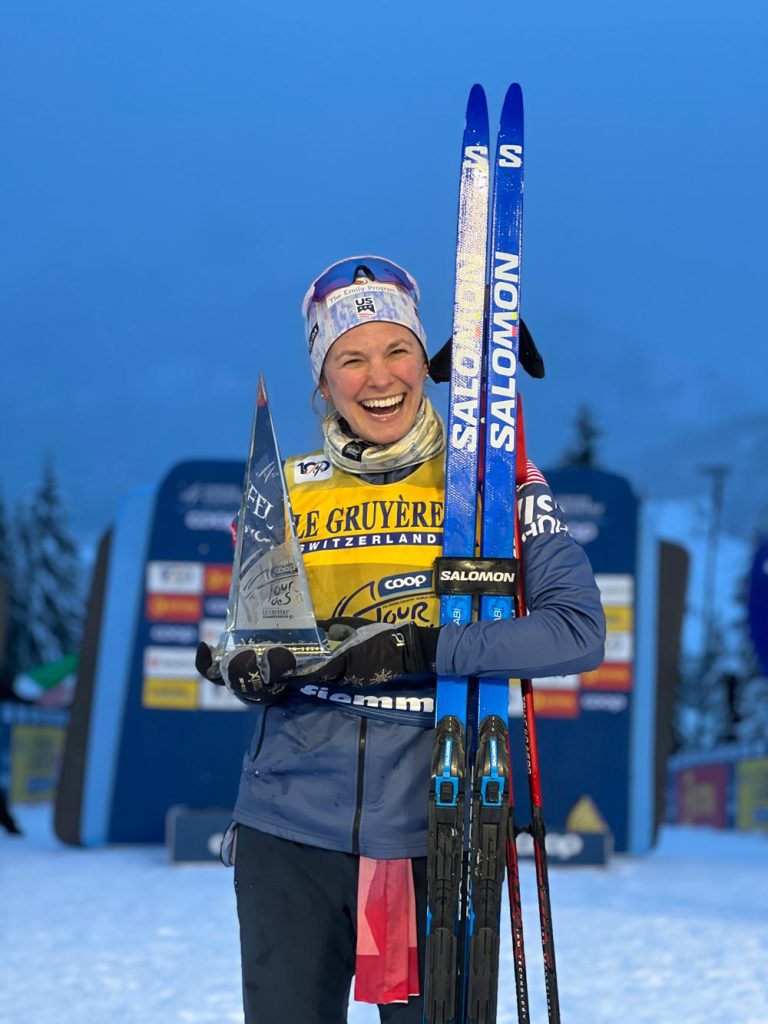
By the end of the Tour, Diggins had stood on the podium in four of the seven stages, competed in two 20km races (the first Tour de Ski with two races of that distance) and held off the competition on the infamous Alpe Cermis on the final day, finishing sixth but holding onto the Tour lead.
“At one point, I knew I had like 30 seconds to play with,” she said of the time gap on runner-up Heidi Weng during the climb. “If I got down to 20, I would have been worried. But with 30 seconds, I was like okay, the wheels are coming off, I cannot feel my legs, I also can’t take a deep breath right now, but I think I can make it to the finish line.”
The hardest part of the Tour, said Diggins, was dealing with sprained ribs, an injury sustained when she fell during the 20km pursuit classic.
With the 300 points awarded to Tour winners, Diggins bolstered her lead for the overall World Cup title. The winner of the Tour de Ski has almost always won the overall .
“Honestly, when I got [the World Cup leader’s gold bib],” confessed Diggins, who has held the World Cup lead since December 2, “my biggest goal was just to collect enough of them to give each of the wax techs a golden bib to thank them and that was pretty much it.”
Ogden’s Best Day
The tour started with a freestyle sprint on December 30. But it was not Diggins making headlines that day. Ogden moved smoothly through the men’s heats and scored his first World Cup podium, coming in third.
“I couldn’t believe I was in that position at the finish line, and I thought to myself that I had what it takes to just land on the podium,” the 23-year-old Vermonter said shortly after being sprayed with Champagne. Ogden donated his winnings to NENSA’s John Ogden Youth and Introductory Program endowment, named after his fathe,r who passed away in late June after a decade-long battle with cancer.
“It was my dad and his ability to instill a love and passion for the sport within me who got me over the finish line today and every other day,” Odgen wrote on Instagram.
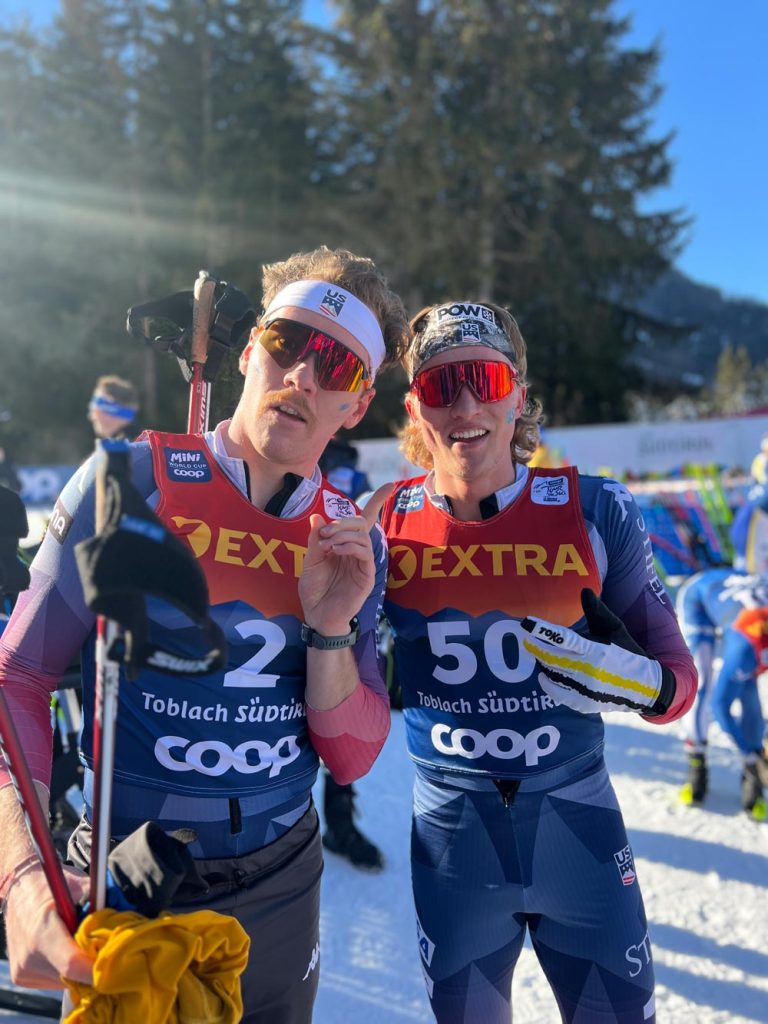
Ogden’s third place, along with JC Schoonmaker’s first World Cup podium in early December , marked the first time in 40 years that two American men have made the top-three in World Cup racing in the same season. The last time was in 1983, when Tim Caldwell and Bill Koch finished second and third in a World Cup. Schoonmaker was set to start the Tour, but illness forced him to withdraw before the race even started.
In the second stage—a 10km classic interval start —Ogden showed that he’s not just a sprinter, finishing ninth and hanging on to third overall in the Tour standings. He also claimed the Tour points lead and did a backflip off the podium. But he, too, succumbed to illness and withdrew after the third stage.
Schumacher Can Sprint!
The day that Ogden woke up sick, Schumacher skied to the fore. In Stage 4, when the Tour had moved to Davos, Switzerland, another skate sprint, the 23-year-old Alaskan finished fourth. Until this year’s Tour, Schumacher had only made the sprint heats in World Cup racing twice. The result moved him into fourth overall in Tour standings.
Then illness came for him, too. “Gonna just be a 4 stage tour for me, woke up feeling sick,” Schumacher posted on Instagram before stage 5. “Definitely a bummer, but I’m just happy to be skiing well and feeling good..”
More Podiums for the U.S. Women
In Stage 5 at Davos—another 20km pursuit, this one classic—it was Rosie Brennan’s turn to make the podium. With a snowstorm and other precipitation making waxing a challenge, the U.S. coaches and techs nailed it. Brennan crossed the finish line in second place, 0.8 seconds from the win—a gratifying finish in a tough tour for the 35-year-old veteran. Diggins, meanwhile, recovered from her crash to finish third.
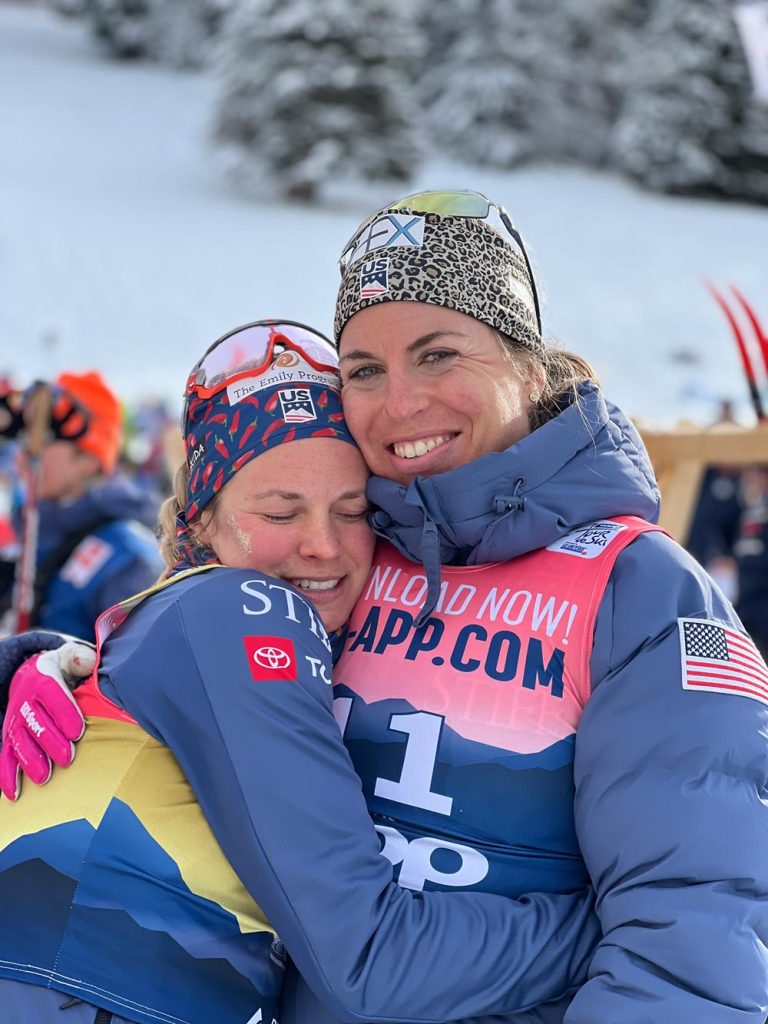
Then it was four hours back to the Italian Dolomites for the final two stages in Val di Fiemme, with the finish atop the infamous Alpe Cermis, an alpine ski slope. There, Laukli skied her best race ever, dropping Norwegian (and two-time Tour winner) Heidi Weng on the Alpe and crossing the finish line for the win, 17.1 seconds in the clear. This was Laukli’s second podium on the Alpe (she finished third in 2023).
“It’s super fun to have my first victory, but also have one of the best races of my life, feelings-wise and tactics-wise,” Laukli said after the win. “Obviously I’ve had the most success in this race, but it’s just really motivating for the rest of the season and future seasons.”
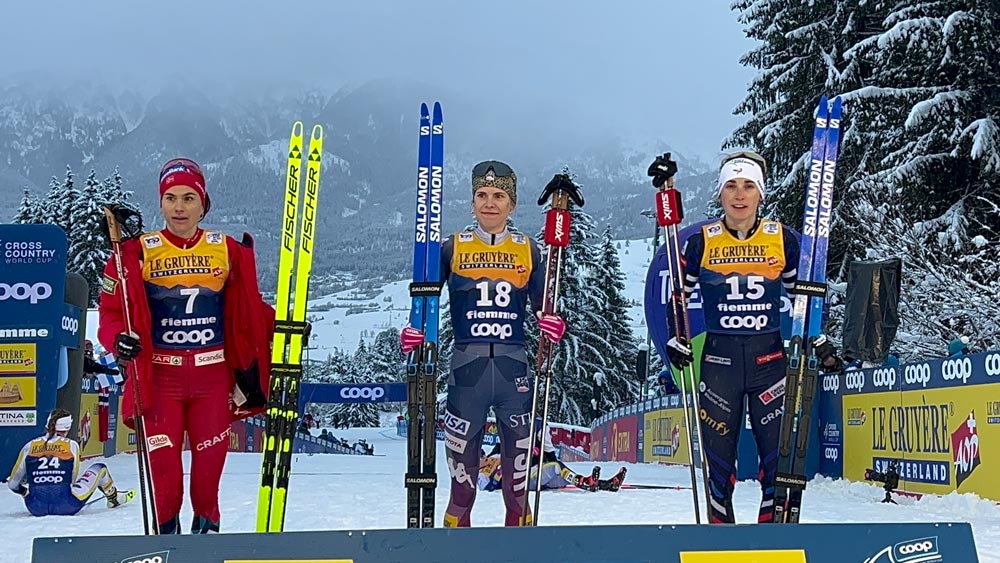
Other notables: Sammy Smith, 18, skipped school to make her Tour debut, finishing 26th overall. Laukli finished 14th overall, the best finish yet for the 23-year-old mountain runner in three tries. Also representing the next generation, Novie McCabe, 22, completed five stages of her second Tour and was sitting in 22nd place when she withdrew. McCabe is the daughter of two-time Olympian Laura McCabe.
For the men, Scott Patterson finished the tour 26th overall. And Zanden McMullen, 22, finished his inaugural Tour in 36th place, with a World Cup best in the Davos sprint (25th).
